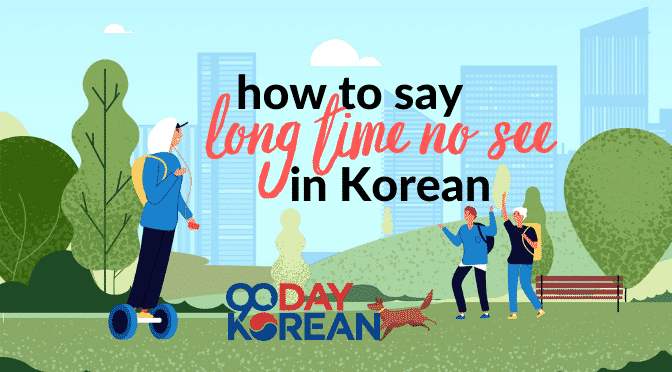Long time no see! It’s been awhile since we last taught you how to say something in Korean, but today we’re back! So it’s only appropriate that today we teach you how to say “long time no see” in Korean.

“Long time no see” in Korean
This phrase is only used in informal and standard Korean speech and is most commonly used among acquaintances and friends. The base vocabulary for the phrase is 오랜만 (oraenman), which translates to “long time”.
오랜만 (oraenman)
long time
You’ll simply attach it to the verb ending of the correct level of politeness to form the phrase “long time no see”. Like this:
Standard:
long time no see
Informal:
오랜만이야 (oraenmaniya)
long time no see
You can also use the word 오랜만 with different conjugations to illustrate similar phrases. For example:
오랜만에 (oraenmane)
in a long time; after a long time
A word of caution about Romanization
While it is possible for you to study the words in this article simply by reading their romanized versions, it will come in handy for you to be able to read Hangeul if you ever wish to come to Korea. Hangeul is the Korean alphabet, and not difficult to learn. In fact, you can learn it in just 90 minutes.
After you’re familiar with Hangeul, life in Korea will suddenly seem so much easier and the country won’t appear as foreign for you. So, if you’re serious about learning Korean, why not learn Hangeul today?

Sample Sentences
Below we’ve laid out a few example sentences, both standard and informal, that you can begin practicing with immediately.
Standard sample sentences
These examples can be used in any situation that doesn’t require you to be exceptionally polite or formal.
오랜만이에요! 그동안 잘지냈어요? → Long time no see! Have you been well?
(oraenmanieyo! geudongan jaljinaesseoyo?)
태영 씨, 오랜만이에요. → Ms. Taeyong, long time no see.
(taeyeong sshi, oraenmanieyo.)
오랜만에 출근을 해서 긴장되고 있어요. → Since I’m going to work for the first time in a long time, I’m feeling nervous.
(oraenmane chulgeuneul haeseo ginjangdoego isseoyo.)
Informal sample sentences
You can use these examples and informal speech with your family, friends and those who are close to you.
남동생이랑 같이 밥을 먹는거 진짜 오랜만이야! → It has been a really long time since I last had a meal together with my little brother.
(namdongsaengirang gati babeul meogneungeo jinjja oraenmaniya!)
오랜만이야! 잘지냈지? → Long time no see! You’ve been well, right?
(oraenmaniya! jaljinaetji?)
Do you already know who you'll want to practice your newly learned 'long time no see' in Korean phrase with first? Show us your sample sentence in the comments below!
Picture Credit: Bigstock
The post How to say “Long time no see” in Korean appeared first on 90 Day Korean®.
 Learn to read Korean and be having simple conversations, taking taxis and ordering in Korean within a week with our FREE Hangeul Hacks series: http://www.90DayKorean.com/learn
Learn to read Korean and be having simple conversations, taking taxis and ordering in Korean within a week with our FREE Hangeul Hacks series: http://www.90DayKorean.com/learn
Korean lessons * Korean Phrases * Korean Vocabulary * Learn Korean * Learn Korean alphabet * Learn Korean fast * Motivation * Study Korean


Recent comments